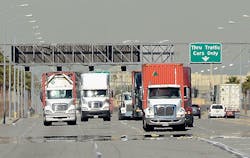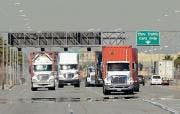PierPass looks back on OffPeak’s first ten years
PierPass Inc is celebrating the 10-year anniversary of the OffPeak program, which established regular night and Saturday work shifts at the Port of Los Angeles and Port of Long Beach, and pledged continuing efforts to minimize cargo-related congestion in and around the ports.
Since July 23, 2005, OffPeak has taken 34 million truck trips out of daytime Southern California traffic and diverted them to less-congested nights and weekends.
OffPeak was created as a private sector solution to what was then a critical public problem: after a rapid rise in cargo volume in the early 2000s, drayage trucks were causing severe congestion on roads and highways and in neighborhoods around ports, while thousands of idling trucks caught in this traffic every day added to air pollution. The ports came under strong community and political pressure to find a solution.
PierPass effectively doubles the capacity of the nation’s largest and busiest port complex without taxpayer money and without waiting for new infrastructure to be built. It enables the economic benefits of cargo transportation—which provides nearly 700,000 Southern California jobs and generates more than $10 billion in state and local taxes annually—while mitigating traffic and air quality impacts of port operations. OffPeak now regularly diverts about half of the roughly 150,000 weekly truck trips to nights and Saturdays.
The mayors of Los Angeles and Long Beach hailed the OffPeak program’s achievements on its 10th anniversary.
“The OffPeak program has facilitated the continued growth of the Port of Long Beach,” said Long Beach Mayor Robert Garcia, “while lowering the adverse environmental impacts of their operations.”
“For the last decade, PierPass has instituted innovative and creative problem solving for the goods movement industry in Southern California,” said Los Angeles Mayor Eric Garcetti. “Their program has helped to bring jobs to America’s #1 port, while helping us reduce our environmental footprint in the Harbor area.”
Using a congestion pricing model, PierPass charges a Traffic Mitigation Fee (TMF) on weekday daytime cargo moves to incentivize cargo owners to use the OffPeak shifts. The TMF also helps pay the cost of operating the OffPeak shifts, which upon introduction in 2005 roughly doubled the labor cost to handle the same amount of cargo. Container volume rose only 6% between 2005 and 2014.
On an average OffPeak weeknight, 13,500 trucks visit the marine container terminals at the Los Angeles and Long Beach ports. If all of these trucks were lined up bumper-to-bumper, they would form a line 145 miles long, stretching halfway to Las Vegas. Without the OffPeak program, this cargo would be crammed into a single day shift, doubling daytime volumes and once again causing severe congestion.
For additional information, see www.pierpass.org.

